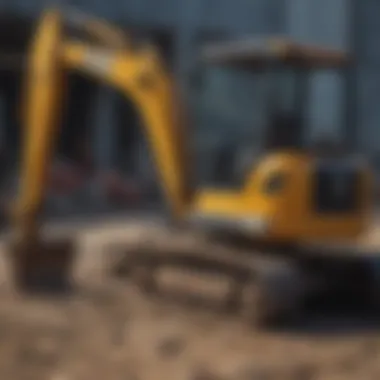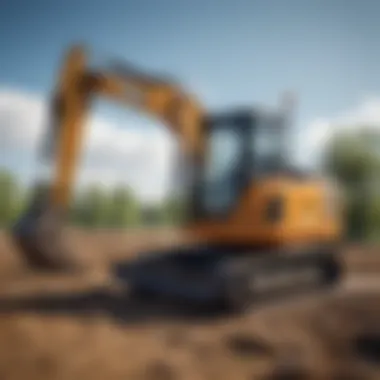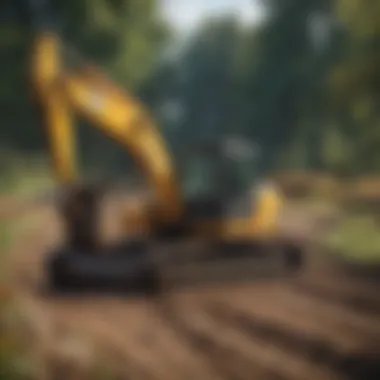Understanding the Costs of Leasing a Mini Excavator


Intro
Leasing a mini excavator can offer a practical approach for builders, landscapers, and farmers. This strategy is especially useful for those who need a machine for a limited time or lack the funds for a full purchase. Understanding the costs involved in leasing is crucial for making informed financial decisions. This section will unpack essential factors, exploring different leasing options and identifying potential additional expenses.
Current Trends in Agriculture and Horticulture
In recent years, the demand for mini excavators has augmented due to their versatility and efficiency in various agricultural tasks. These machines are increasingly being used for soil preparation, drainage installation, and even landscaping tasks like creating irrigation systems.
Overview of Recent Innovations
Technological advancements are shaping the way mini excavators are built and used. Modern machines often come equipped with advanced GPS technology and improved hydraulic systems that enhance performance. These innovations allow operators to achieve greater precision in tasks, which can lead to increased productivity and reduced operational costs.
Sustainable Practices Gaining Popularity
Sustainability is becoming a cornerstone of agricultural practices. Leasing a mini excavator can reduce the environmental footprint compared to purchasing older models which may be less efficient. Newer, leased machines often run on cleaner fuels and consume less energy, aligning well with sustainability goals. Farmers are increasingly aware of the benefits of using updated machinery to support eco-friendly practices.
Essential Farming Techniques
To leverage the capabilities of a mini excavator, knowledge of essential farming techniques is important. These practices can enhance productivity and ensure the effective use of the leased equipment.
Soil Health Management
Proper soil management is crucial for any farming operation. Using a mini excavator can facilitate soil testing and amendment applications. Techniques such as tilling, which can be performed with the appropriate attachment, will promote healthier soil. It helps in aeration and improving microbial activity.
Pest and Disease Control Strategies
Another area where a mini excavator can assist is in pest and disease management. Farmers can utilize the machinery to create drainage systems that prevent standing water, a common breeding ground for pests. Additionally, excavators are useful in clearing land to reduce pest habitats.
Tools and Technology in Farming
The merging of technology with agriculture is fostering innovations that enhance efficiency and sustainability. With mini excavators becoming pivotal in agricultural contexts, understanding the tools and technology associated with them is key.
Overview of Advanced Farming Tools
Apart from the mini excavator itself, several advanced farming tools can optimize operations. Technologies like drones for monitoring crop health or sensors for soil moisture levels complement the excavator's capabilities, providing a comprehensive farming solution. These tools are a testament to the evolving nature of agriculture.
Case Studies on the Use of Technology
Analyzing real-world applications of technology in farming can provide insights into best practices. For instance, a study showed how a local farmer reduced labor costs by 30% using leased mini excavators combined with remote sensors. The integration of these tools enhanced operational efficiency, allowing for smarter resource management.
"Investing in leased equipment can maximize productivity while keeping costs manageable. Understanding these costs fully ensures that the investment aligns with business goals."
In summary, leasing a mini excavator is not just a matter of choice; it is a strategic decision that requires a solid understanding of financial implications, technology integration, and effective management practices in agriculture.
Overview of Mini Excavators
In the realm of construction and landscaping, mini excavators have gained notable traction due to their versatility and efficiency. They serve as compact machines that can navigate tight spaces while delivering impressive performance. Understanding mini excavators is crucial for those considering leasing options, as it directly impacts the types of leasing agreements one may pursue. Additionally, grasping the functionalities of these machines can prevent unnecessary costs and enhance productivity on the job site.
Definition and Purpose
Mini excavators are small, tracked vehicles equipped with a front-mounted bucket and arm. The primary purpose of these machines is to dig and move earth. Their design allows for precision in excavation tasks, which is vital in both commercial construction and residential landscaping projects. These machines can operate in confined areas where larger excavators cannot. This can include backyards, garden projects, or sites with existing structures. Understanding this definition sets the foundation for evaluating leasing options and applying them effectively to various tasks.
Common Applications
The applications of mini excavators are diverse, allowing them to be utilized across several fields. Among the most common applications are:
- Digging trenches for plumbing or electrical installations.
- Landscaping projects such as planting trees or reshaping terrain.
- Demolition of small structures or parts of larger buildings.
- Grading and leveling of land for foundations or surface preparation.
- Utility work, including installing or repairing water and sewer lines.
The ability to operate in tight spaces makes mini excavators particularly valuable for urban development projects. They are also becoming increasingly popular among farmers for tasks like land clearing and digging out smaller drainage areas. By recognizing these applications, potential lessees can more clearly define their needs and select the appropriate machinery for their projects.
Leasing Basics


Leasing mini excavators is an increasingly popular option for both businesses and individuals needing machinery for construction or landscaping projects. Understanding the basics of leasing is crucial. This section explores essential elements that impact decisions regarding leasing agreements. It highlights various benefits and considerations that come into play when a lessee contemplates this option.
What Does Leasing Entail?
Leasing a mini excavator generally involves an agreement between the lessor, who owns the equipment, and the lessee, who needs to use it for a defined period. In this arrangement, the lessee pays a fee, usually monthly, for the duration of the lease. The terms can vary greatly, impacting overall costs.
Leasing entails more than just the payment. Often, the lessee must maintain the equipment in good condition, adhere to usage guidelines, and may be responsible for insurance. This responsibility can be double-edged; while the lessee gains access to expensive machinery without the upfront costs of purchasing, they must ensure compliance with the lease terms to avoid penalties.
Key elements to consider include:
- Duration of lease: Terms can range from a few months to several years.
- Usage limitations: Some agreements restrict how many hours the machine can be used monthly.
- Maintenance obligations: Knowing if maintenance is covered or solely the lessee's responsibility is important.
- End-of-lease options: These may include purchasing the equipment or renewing the lease.
Understanding these aspects helps lessees to manage expectations and aligns their projects with the requirements of the lease.
Differences Between Leasing and Purchasing
The decision to lease versus purchase a mini excavator hinges on various factors. Each option presents its distinct benefits and drawbacks.
- Cost Considerations: Leasing typically requires lower initial costs compared to purchasing, which usually involves a significant down payment. Lease payments can often be deducted as a business expense.
- Flexibility: Leasing provides the opportunity to upgrade equipment regularly. Businesses can choose newer models as they become available without being tied to a long-term investment.
- Ownership Risks: When purchasing, the full financial responsibility falls on the owner, including depreciation, maintenance, and resale value. Conversely, leasing limits the financial exposure to the periodic payments and leaves the lessor responsible for equipment depreciation.
- Tax Implications: Lease payments can often be expensed, while purchased equipment typically must be depreciated over time.
"Leasing allows greater flexibility and lower upfront costs but lacks the depth of investment ownership provides."
In summary, the choice between leasing and purchasing mini excavators reflects the specific needs of the lessee, their financial situation, and how they plan to use the equipment in the short and long term. Each option carries its particular advantages that should be weighed carefully.
Cost Factors in Leasing a Mini Excavator
Leasing a mini excavator can be financially advantageous, but the associated costs must be fully understood. There are several key factors that influence expenses when leasing, affecting both short-term budgets and long-term financial planning. Understanding these cost factors is essential for making informed decisions. By examining elements such as base lease rates, duration of lease, type of equipment, and seasonal demand, lessees can better forecast total leasing costs. This understanding helps avoid unexpected expenses and ensures that a project remains on budget.
Base Lease Rates
Base lease rates are the starting point when considering leasing costs. These rates vary significantly based on the leasing company, geographic region, and market demand. A lessee should always request a detailed quote from the leasing company, including the base rate as well as any possible fluctuations tied to demand or availability of mini excavators. Base rates may also differ depending on the specific features of the unit being leased, such as size and attachment capabilities.
Often, larger or more specialized mini excavators will command higher lease rates. It’s critical to understand what the base rate covers, particularly regarding the condition of the machine and included services. A well-maintained machine could result in lower maintenance costs over time, potentially offsetting a slightly higher base rate.
Duration of the Lease
The duration of the lease is another significant cost factor. Leasing companies typically offer various lease lengths, ranging from short-term to long-term agreements. The decision on duration should depend on the specific nature of a project. Shorter leases usually have a higher monthly rate, but may come with flexibility. Long-term leases might offer lower rates, but they could also tie up capital for longer periods.
When determining the appropriate lease duration, consider project timelines, seasonal work, and whether the equipment will be needed continuously. Projects that have unpredictable time frames may benefit from short-term leasing, while stable projects may allow for cost savings through longer lease agreements.
Type of Mini Excavator
The type of mini excavator being leased plays an important role in the overall cost. There are various models available, each designed for specific tasks. A basic model may cost significantly less than a more advanced unit with enhanced features, such as advanced hydraulic systems or specialized attachments.
Consider the specific requirements of the job. Using a more powerful excavator might seem advantageous but could lead to higher lease rates without a justified return on investment. Evaluating the necessary features against the rental costs is crucial to ensure you are not overspending on equipment that exceeds your project needs.
Seasonal Costs and Demands
Lastly, seasonal costs and demands significantly impact leasing prices. Demand for mini excavators can fluctuate with construction seasons and geographic factors. For instance, in warmer months, when construction activity peaks, lease rates might rise due to heightened demand. Conversely, colder months may see reduced demand and lower rates.
Understanding these seasonal trends can allow for strategic planning. Sometimes, waiting until off-peak times can result in significant savings. Additionally, companies may offer seasonal promotions or discounts during slower periods, so staying informed about market conditions is advisable.
"The key to minimizing costs in leasing a mini excavator lies in understanding when to lease, what to lease, and for how long."
By factoring in these elements, individuals and organizations can make more strategic choices about leasing a mini excavator while managing project budgets effectively.
Types of Leasing Arrangements
Leasing a mini excavator can offer flexibility and convenience for agriculture farmers and enthusiasts. However, the type of lease you choose is fundamental in shaping your overall leasing experience. Each arrangement has unique features, structuring financial obligations differently and catering to various needs. Understanding these arrangements allows one to select an option that aligns well with specific project goals and budget constraints.
Operating Lease


An operating lease is often more short-term, allowing users to rent equipment without the intention of ownership at lease end. This arrangement is suitable for those who need machinery for a limited duration or want to avoid the complexities of maintenance and depreciation.
Benefits of an Operating Lease:
- Lower Monthly Payments: Generally, these leases feature lower monthly payments since the lessee only covers a portion of the equipment's value based on its expected use.
- Flexibility: At the end of the lease, the lessee can return the mini excavator, renew the lease, or upgrade to a newer model. This flexibility can be advantageous for farmers who may need different machinery seasonally.
- No Maintenance Responsibility: Often, the lessor is responsible for major maintenance, relieving leaseholders of additional costs.
Considerations:
- Usage Limits: Some operating leases may include usage limits. Exceeding this can result in extra charges.
- No Ownership Equity: Since this type of lease does not lead to ownership, farmers will not accumulate equity in the equipment when the lease ends.
Capital Lease
Capital lease, on the other hand, is typically more long-term. It essentially functions like a loan where, after fulfilling the lease obligations, the lessee gains ownership of the excavator. This arrangement can be beneficial for those expecting long-term use of a mini excavator.
Benefits of a Capital Lease:
- Ownership at End of Lease: At the conclusion of the lease, the lessee often has the option to purchase the equipment for a predetermined price, making this more appealing for long-term use.
- Tax Benefits: Many lessees can deduct depreciation on the equipment from their taxes, enhancing cost-effectiveness.
- Customization: Leasing arrangements can offer more freedoms for customization, allowing operators to modify the excavator to meet specific needs or preferences.
Considerations:
- Higher Monthly Payments: The payments are typically higher compared to operating leases, as they cover a greater portion of the equipment's value.
- Maintenance Costs: Lessees may be responsible for maintenance and repairs, which can be financially demanding.
Understanding and carefully choosing between an operating lease and a capital lease can significantly impact financial outcomes for agricultural projects.
Both leasing options present distinct advantages and considerations. A farmer's specific needs and long-term plans are crucial to making the right decision.
Additional Costs Associated with Leasing
When leasing a mini excavator, it is essential to understand that the initial lease payment serves as just one component of the overall costs. There are additional expenses that could affect the total financial outlay of the project. These costs are important to examine as they have direct implications for project budgets and long-term decisions. Recognizing these costs aids in effective financial planning and prevents surprises down the line.
Insurance Requirements
Insurance is a crucial aspect of leasing equipment. Most leasing companies require that the lessee carries insurance coverage for the duration of the lease. This protects both the lessor and the lessee from financial losses due to damage, theft, or accidents. Common types of insurance needed include liability coverage and property coverage.
- General Liability Insurance: Covers damages or injuries that might occur during the lease period.
- Equipment Insurance: Protects against theft or damage to the mini excavator itself.
Failing to have adequate insurance coverage can lead to substantial out-of-pocket expenses in case of unforeseen incidents. Therefore, understanding the specific requirements of the leasing company is vital.
Maintenance Fees
Maintenance fees are another aspect that can increase leasing costs. Depending on the lease agreement, the lessee might be responsible for maintaining the mini excavator during the rental period. Regular maintenance is necessary to keep the equipment in optimal condition, which can include oil changes, filter replacements, and equipment inspections. The costs can vary widely based on the age and condition of the excavator as well as the complexity of the required maintenance.
It is advisable to clarify with the leasing company who will bear the maintenance costs. Some firms may offer maintenance packages as part of the leasing agreement, reducing the burden on the lessee.
Transportation Costs
Transporting the mini excavator from the rental facility to the worksite adds another layer of potential expense. These costs can depend on distance, local transportation rates, and any required equipment to load and unload the machine. Some leasing companies include transportation in the lease agreement, while others may charge additional fees.
- Consider hiring a professional transportation service if you lack the proper vehicles or trailers.
- Evaluate the benefits of local versus remote leasing to determine if the transport cost is justified.
Understanding these costs upfront helps in creating a more accurate budget.
Security Deposits
Another common cost involved in leasing a mini excavator is the security deposit. This deposit acts as a form of protection for the leasing company against potential damages or excessive wear and tear. The amount of the deposit can vary significantly depending on the value of the equipment and the terms of the lease agreement.
Typically, the security deposit is refundable at the end of the lease period, assuming the excavator is returned in good condition. Regardless, it is essential to factor this deposit into your overall budget when calculating leasing expenses.
Evaluating Leasing Companies
When embarking on the journey of leasing a mini excavator, it is crucial to assess the leasing company itself. The choice of leasing company can significantly influence not only the financial aspects of your project but also the quality of service provided throughout the lease period. Understanding how to evaluate leasing companies ensures you select a partner that meets your needs effectively.


Reputation and Experience
A company’s reputation speaks volumes about its reliability and service quality. Look for leasing companies that have established a solid track record in the industry. This can often be assessed through customer reviews, ratings, and testimonials.
Experience also plays a vital role. A seasoned company has likely navigated various market challenges and is better equipped to offer sound advice. Experienced firms usually maintain a diverse inventory of mini excavators suited for different applications.
- Research Customer Feedback: Check online forums, social media platforms, and review sites like Reddit or Facebook to gauge customer satisfaction.
- Industry Presence: Companies that are actively involved in industry exhibitions or trade shows tend to stay updated with trends and technologies, further confirming their credibility.
Customer Service Quality
The level of customer service provided by a leasing company can make or break your leasing experience. Strong customer service often facilitates smoother interactions and faster resolutions to issues arising during the lease.
A good leasing company should offer clear communication channels and responsive support. Evaluate how quickly they address inquiries and concerns. Consider their willingness to go the extra mile.
- Accessibility: Ensure they offer multiple contact options, whether through phone, email, or chat.
- Personalized Service: A company that prioritizes personalized service demonstrates commitment to meeting your project’s unique needs. Take note of how they tailor their offerings based on your requirements.
Lease Terms Comparison
One of the most critical steps in evaluating leasing companies is the comparison of lease terms they offer. These terms may vary significantly between providers, making it vital to scrutinize them closely.
Look for the following aspects when comparing lease agreements:
- Flexibility: How flexible are the lease terms regarding duration, early termination, and equipment modification?
- Hidden Costs: Understand any hidden fees that could arise, such as maintenance charges or penalties.
"All lease agreements are not created equal. Understanding the nuances of each one can save you both time and money."
- Inclusions: Clarify what is included in the lease. Does it cover maintenance, insurance, or transportation costs?
- Renewal Options: Consider if there are options to renew or buy the equipment at the end of the lease period.
By carefully evaluating leasing companies on these fronts, you are more likely to make an informed decision that aligns with your project’s financial and operational goals.
Negotiating Lease Agreements
Negotiating lease agreements is a critical element of the leasing process for a mini excavator. This stage not only influences the financial terms but also impacts the overall experience during the lease period. Engaging effectively in this phase can lead to more favorable terms and reduce unnecessary costs over time.
Understanding Lease Terms
When entering negotiations, it is vital to have a clear understanding of lease terms. This includes factors such as payment schedules, lease duration, and maintenance responsibilities. A common mistake is to overlook the fine print. Unsatisfactory terms can lead to conflicts and unexpected expenses. It is advantageous to clarify points such as:
- Payment Structure: Understanding whether payments are monthly, quarterly, or follow another structure.
- Use Limitations: Knowing whether the lease permits unrestricted use and under what conditions restrictions apply.
- Return Conditions: Awareness of the expectations for the equipment’s condition upon return can prevent disputes at the end of the lease.
A thorough comprehension of these aspects not only empowers you during negotiations but also prepares you for a smoother leasing experience.
Finding the Best Rates
Finding the best rates is essential to ensure that leasing a mini excavator aligns with budget constraints. It is beneficial to research various leasing companies and their offerings. Considerations such as overall market rates and seasonal demand can influence pricing significantly. Here are some strategies for obtaining optimal rates:
- Compare Multiple Offers: Collect quotes from several leasing companies. Ensure you understand what each offers beyond just price.
- Ask About Promotions: Sometimes, companies provide special deals or discounts. It’s worthwhile to inquire about these opportunities during negotiations.
- Leverage Relationships: If you have an existing rapport with a leasing company, use that to negotiate better rates. Loyalty can sometimes yield better terms.
In many cases, companies may be open to adjusting their rates based on your negotiation skills and willingness to engage in dialogue.
Closure
The conclusion serves as a vital component in the exploration of leasing a mini excavator. Understanding the various aspects of leasing culminates in recognizing the significance of informed decision-making for both individuals and organizations within construction and landscaping fields. It is crucial to synthesize the details examined throughout this article, allowing readers to grasp the financial implications thoroughly.
Summary of Key Points
- Cost Factors: Base lease rates, duration of lease, the type of excavator, and seasonal demands all contribute to the overall expenses.
- Types of Leasing Arrangements: Familiarity with operating and capital leases can shape your selection based on project needs.
- Additional Costs: Consider factors like insurance, maintenance fees, transportation, and security deposits that could affect total lease cost.
- Reputation and Negotiation: Choosing a reputable leasing company and understanding lease terms can have a significant impact on costs.
This overview encapsulates the most important elements that one should keep in mind when considering leasing a mini excavator, ensuring that each decision made is based on a solid foundation of knowledge.
Final Considerations for Leasing
Before entering a lease agreement, it is essential to consider:
- Assess your operational needs and how a mini excavator will aid your project.
- Evaluate your budget constraints to avoid unforeseen costs.
- Research various leasing companies to find favorable terms that reflect your requirements.
- Acknowledge that leasing offers flexibility but can lead to ongoing costs if not monitored effectively.
Ultimately, a thorough understanding of both the costs and benefits associated with leasing prepares farmers and enthusiasts to make sound choices that align with their agricultural objectives.



